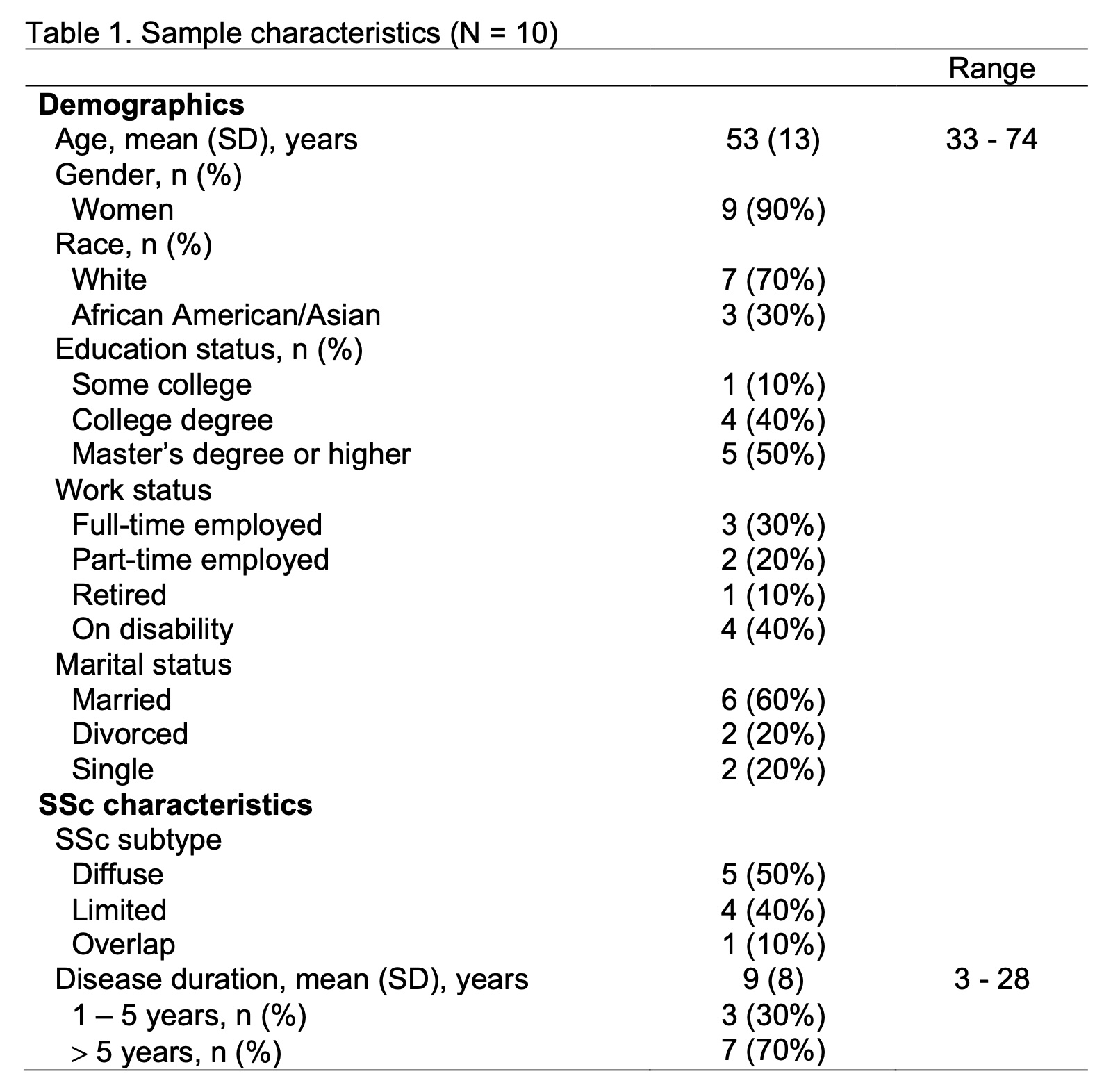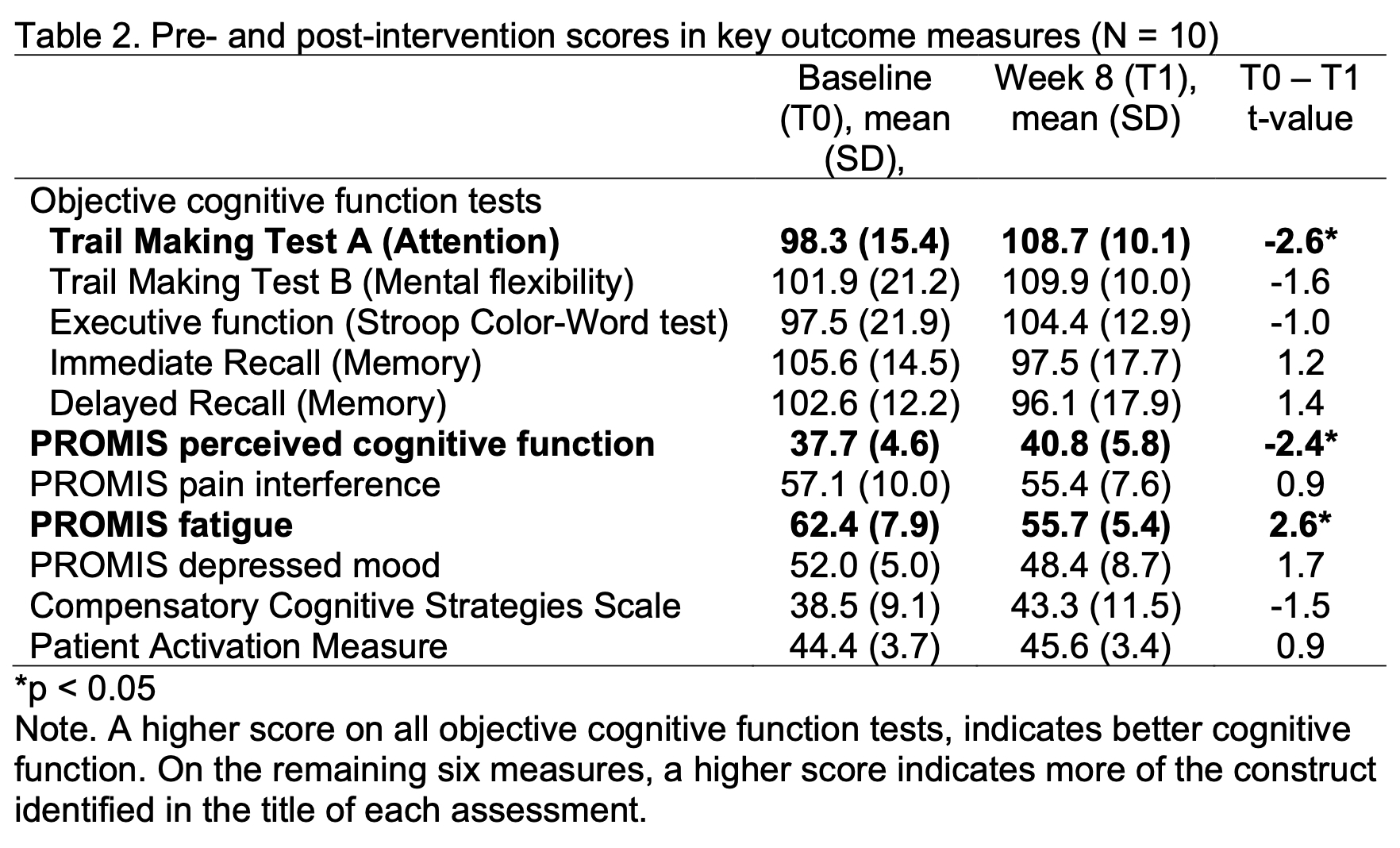Session Information
Session Type: Abstract Session
Session Time: 3:00PM-4:30PM
Background/Purpose: Cognitive dysfunction affects up to 87% of individuals with systemic sclerosis (SSc), often significantly impairing their work and daily activities and exacerbating other symptoms such as pain, fatigue, and depressed mood. Cognitive dysfunction could also make managing SSc more challenging and reduce the effectiveness of self-management interventions. Cognitive rehabilitation interventions have been shown to improve cognitive function, alleviate symptoms, and enhance disease self-management. We adapted and tested one such intervention, specifically tailored for people with SSc, into an 8-week online format with a co-facilitator who has SSc. We examined the acceptability, feasibility, and impact of health-related outcomes of this intervention.
Methods: We recruited participants from a SSc registry who perceived moderate to severe cognitive dysfunction (≥ 10 on the Perceived Deficits Questionnaire). Eight online educational sessions were combined with the practice of an evidence-based brain-training program. Our tailored online intervention addressed the travel and physical constraints people with SSc face. Online educational sessions were co-led by an individual with SSc to provide unique patient perspectives and offer peer support. We assessed cognitive function using the Trail Making Test (TMT) A (attention), TMT B (mental flexibility), the Stroop Color-Word test (executive function), Immediate Recall (memory), and Delayed Recall (memory). Additionally, PROMIS measures of perceived cognitive function, pain, fatigue, and depressed mood, as well as the Compensatory Cognitive Strategies Scale and Patient Activation Measure (disease self-management) were assessed. Outcomes were evaluated at baseline and week 8 (post-intervention). Paired t-tests were used to examine pre- and post-test differences. The significance level was set at 0.05. A post-intervention feedback questionnaire and attendance records were used to evaluate the acceptability and feasibility of the intervention.
Results: Ten participants were enrolled (mean age = 53 ± 13 years; 5 diffuse SSc subtype) (Table 1). Although most cognitive function test scores did show significant changes, attention improved significantly at week 8 (t (8) = -2.6, p = 0.03). Additionally, perceived cognitive function and fatigue showed significant improvements at week 8 (t [9] = −2.4, p = 0.04 and (t [9] = 2.6, p = 0.03, respectively) (Table 2). All participants rated the program as either good or excellent. They reported learning new cognitive strategies or lifestyle modifications to improve their brain function, with 90% indicating they would continue using these strategies. Ninety percent of the participants had perfect attendance or missed only one online session.
Conclusion: Cognitive dysfunction is a prevalent issue in SSc. Cognitive rehabilitation interventions, such as the one piloted in this study, hold promise for improving attention, self-reported cognitive function, and reducing fatigue among people with SSc and may also benefit those with other chronic conditions. Although our pilot study was well-received by participants and demonstrated feasibility, a larger randomized trial is needed to test its efficacy.
To cite this abstract in AMA style:
Chen Y, Alore M, Khanna D, Murphy S. Adapting and Testing a Cognitive Rehabilitation Intervention Tailored for People with Systemic Sclerosis: Acceptability, Feasibility, & Impact on Health-related Outcomes [abstract]. Arthritis Rheumatol. 2024; 76 (suppl 9). https://acrabstracts.org/abstract/adapting-and-testing-a-cognitive-rehabilitation-intervention-tailored-for-people-with-systemic-sclerosis-acceptability-feasibility-impact-on-health-related-outcomes/. Accessed .« Back to ACR Convergence 2024
ACR Meeting Abstracts - https://acrabstracts.org/abstract/adapting-and-testing-a-cognitive-rehabilitation-intervention-tailored-for-people-with-systemic-sclerosis-acceptability-feasibility-impact-on-health-related-outcomes/


